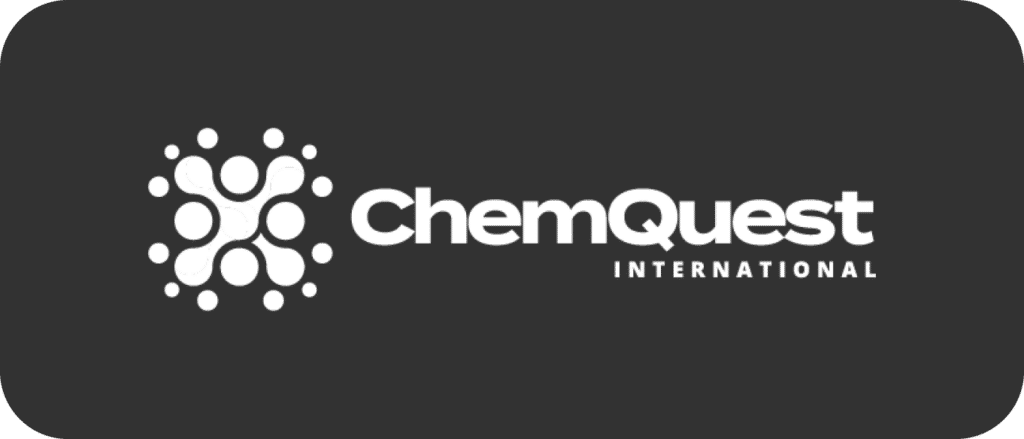The Marketing Agency for Chemical Companies
The specialty chemicals industry is at an inflection point. Manufacturers, distributors and brokers are facing increased global competition, regulatory pressures, financing challenges, complex supply chains, and ever-lengthening sales cycles.
Meanwhile, buyers are increasingly finding and vetting suppliers online, reducing the impact of legacy business development activities. In this environment, it’s critical to have a memorable brand, a lead generation engine, and a marketing platform that supports sustained growth. That’s what Altitude does – and why we’re the leading marketing agency for chemical, gas and ingredient companies.

Specialty chemical, gas and ingredient providers need a special kind of B2B marketing agency.
The chemical marketplace is unlike any other. It’s interconnected globally, but reliant on regional providers and distributors. It touches everything from the industrial market to cosmetics, the life sciences, food/beverage and CPG. It’s hyper-critical to the products all of us use every day, but also typically in the background – with vendors noticed only when something goes wrong.
Understanding that – and being able to articulate it in a way that gets prospects’ attention, drives leads and converts sales – is difficult. Most marketing agencies simply can’t serve chemical companies. The complexity of the subject matter and the nuances of chemicals, active and inactive ingredients and industrial gases are usually too much.
An outsourced marketing partner for chemical companies needs a proven track record in the space. They need integrated teams of content producers, strategists and creatives. And they need to know how to translate 30,000-foot business goals into tactical execution … and real results.
For specialty chemical companies, that agency is Altitude Marketing.
You can trust our chemicals industry experience and expertise.
Marketing for the chemical, ingredient and gas industries is often split into two types of service providers: generalists who don’t get the science, and technical specialists with minimal “on-the-ground” marketing experience.
Altitude is different. We offer the ideal combination of chemical sector expertise and marketing chops. We’ve built a team that starts with the science, but we’re never myopic. Our ability to cross-pollinate technical marketing chops with cross-industry best practices is unmatched. The result? Our chemical industry clients stay 1-2 years ahead of industry norms, giving them an invaluable advantage.
That’s not to say our scientific roots don’t go deep. We’ve been working in and around the chemical and life science spaces for 20 years. We’ve powered GTM and customer acquisition strategies for actives manufacturers, inactives distributors, custom adhesives providers, air separation specialists and more. Why shouldn’t you be next?

Request a Proposal
Ready to work with the top specialty chemical and ingredient marketing agency? Altitude uses the latest tech to execute more efficiently than anyone – and get you results faster than you ever thought possible. Contact us and one of our experts will be in touch with you within one business day.
Our Chemical & Gas Marketing Specialties
Chemical Marketing Agency FAQs
What is a chemical marketing agency?
A chemical marketing agency is a specialized firm that focuses on promoting and selling chemicals and related products to other businesses, rather than individual consumers. These agencies are experts in the chemical industry and provide a range of marketing services tailored to the unique needs and regulatory requirements of chemical manufacturers and suppliers.
Their services may include market research, branding, digital marketing, sales strategy development, and supply chain solutions. By leveraging industry knowledge and marketing expertise, a chemical marketing agency aims to enhance its clients’ market presence, connect them with potential business customers, and ultimately drive sales and growth within the competitive chemical, ingredient and industrial gas sectors.
What does a chemical marketing agency offer clients?
By partnering with a chemical marketing agency, companies can leverage specialized expertise to not only raise awareness of their innovations but also to position themselves as credible and trustworthy entities in a highly competitive and regulated space. Whether it’s introducing a new polymer, a groundbreaking technology or a novel service line, a chemical marketing agency helps in articulating the value proposition and engaging with both the scientific community and potential investors or partners.
What is Altitude's chemical marketing team makeup?
We employ 35 full-time team members (all based in our Emmaus, Pennsylvania HQ), along with more than a dozen on-demand contract workers worldwide. Our team is built to scale with our chemical, ingredient and industrial gas clients’ needs. We deploy dedicated account teams for every client, with experts assigned based on industry and need. These teams – led by our partners – are designed to stay as consistent as possible throughout the engagement.
Who is Altitude's ideal client?
Our ideal client:
- Is a technical company selling to other businesses
- Has a small marketing team or a distinct need (e.g., marketing automation consulting or content production)
- Values candid counsel
- Can comfortably support a monthly budget of $6,000 or more
Obviously, that covers a lot of ground. Our clients include massive global brands, as well as well-funded startups and growth-stage chemical firms, as well as everything in-between.
How does chemical industry marketing differ from traditional marketing?
Chemical industry marketing significantly differs from traditional marketing due to the unique nature of the industry, which combines highly specialized scientific innovation, strict regulatory environments and a niche audience of professionals and stakeholders. Here are the key distinctions:
Audience Knowledge Level: Chemical marketing targets a highly educated audience, including scientists, product leads, manufacturers and industry experts, requiring content that is both scientifically accurate and engaging. Traditional marketing, in contrast, often targets a broader, less specialized audience.
Regulatory Considerations: The chemical industry is heavily regulated, with strict guidelines on how products can be marketed, especially those related to health and nutrition. Chemical industry marketing must navigate these regulations to ensure compliance, a concern less prevalent in many other sectors.
Complex Product Understanding: Chemical and gas products and services often involve complex scientific principles and technologies. Marketing these products requires a deep understanding of the science behind them to effectively communicate their benefits and differentiators.
Long Sales Cycles: The development and approval processes for chemical and ingredient vendors can take years. Marketing strategies must therefore be designed to maintain engagement over long periods, unlike traditional marketing, which can often drive quicker conversions.
Stakeholder Diversity: Chemical marketing must address a diverse range of stakeholders, including investors, potential collaborators, and end-users. Each group requires tailored messaging that speaks to their specific interests and concerns.
How much does a B2B chemical marketing company cost?
Every communications firm has its own rate structure. Most full-service agencies, however, charge based on a “retainer” model, allowing for a set amount of hours of work each month.
In general, assume that a chemical marketing company costs at least $5,000/month for professional services, plus at least $2,000 in media spend.
How do you measure the success of chemical company marketing campaigns?
Measuring the success of a chemical industry marketing campaign involves a combination of quantitative metrics and qualitative insights to capture the campaign’s impact on your target audience and business goals. Here are key indicators to consider:
Lead Generation and Quality: Track the number and quality of leads generated through the campaign. High-quality leads are those that fit your target customer profile and show a genuine interest in your solutions, indicating a higher likelihood of conversion.
Engagement Metrics: Analyze engagement metrics such as website traffic, time spent on site, and interaction with content (downloads, webinar sign-ups, etc.). Increased engagement with campaign materials suggests that your messaging resonates with your audience.
Conversion Rates: Monitor conversion rates from leads to opportunities and from opportunities to customers. A successful campaign should yield a noticeable improvement in conversion rates, demonstrating an effective call to action and audience alignment.
Customer Feedback and Sentiment Analysis: Collect feedback from customers and analyze sentiment about your brand and products on social media and other online platforms. Positive feedback and sentiment growth indicate effective brand positioning and campaign messaging.
Return on Investment (ROI): Calculate the ROI of your campaign by comparing the revenue generated from converted leads against the campaign’s costs. A positive ROI demonstrates financial success and justifies the investment in the campaign.
Market Share Growth: Evaluate any changes in your market share within the biotech industry. Gaining market share following a campaign can signal successful differentiation and increased brand preference among your target audience.
Awareness and Brand Recognition: Measure the increase in brand awareness and recognition using surveys, social media mentions, and media coverage. Increased awareness is a precursor to engagement and conversion, crucial for long-term growth.
Educational Impact: In the chemical and gas sector, educating the market can be a primary goal. Assess the effectiveness of your campaign in educating your audience about new technologies or treatments by looking at engagement with educational content and feedback from industry stakeholders.
By combining these metrics, chemical and ingredient companies can gain a comprehensive understanding of their marketing campaign’s performance, allowing for data-driven decisions to optimize future marketing efforts and strategies.
Can a chemical marketing agency help attract investors and funds?
Yes, a chemical industry marketing agency can significantly assist with investor relations and fundraising efforts. These agencies specialize in communicating the value and potential of biotech innovations to a wide range of stakeholders, including potential investors, partners and the broader market. Here’s how they can help:
Strategic Messaging: A chemical marketing agency can help develop a compelling narrative around your technology, its benefits and its market potential. This narrative is crucial for attracting interest and investment.
Investor Presentations and Materials: They can create professional, informative, and engaging presentation materials tailored to the investor audience. These materials can include pitch decks, executive summaries, and financial models that clearly articulate the investment opportunity.
Public Relations: By leveraging their networks and expertise in public relations, these agencies can increase your visibility in the industry, helping to attract the attention of investors and partners.
Digital Marketing: Through targeted digital marketing strategies, including social media, content marketing, and email campaigns, agencies can help raise awareness and build a community of supporters around your biotech venture.
Event Planning and Management: Agencies can organize and manage events such as investor days, webinars, and conferences that provide opportunities to directly engage with potential investors and partners.
Market Research and Analysis: They can conduct market research and analysis to identify potential investors and partners, understand their interests and concerns, and tailor your approach to meet their needs.
How do I contact Altitude Marketing?
Fill out the form at https://altitudemarketing.com/contact-altitude/ or call 610-421-8601 x122.
Ready to work with the best chemical industry marketing agency?
We help scientific and technical brands tell their stories and drive real results. Let’s talk about what Altitude can do for your company.

Fine-tuning the brand message, optimizing search, creating content, building awareness and driving new prospects to our website have brought ZefSci into the digital marketing era, delivering results for our business.
Rick Carberry, Director of Marketing & Business Develoment ZEFSCI